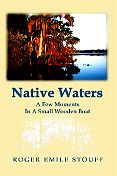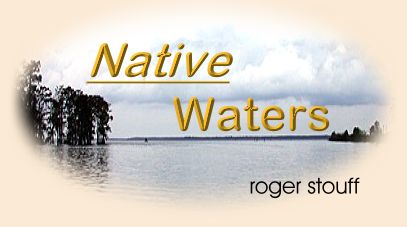|
(EDITOR'S NOTE: This is the third in a
series of columns on Stouff's recent trip
to Browning, Montana to fish for trout on
the Blackfeet Indian Reservation for an
upcoming episode of "Fly Fishing America"
to be aired next spring.)
The Rocky Mountains were created between
50 and 100 million years ago, one of the
major geologic events of the North American
continent. Stretching from Colorado into
Canada, these jagged mountains include
Glacier National Park in northwest Montana.
An ocean once lay here, and its marks can be
found in the rocks that formed the mountains.
From the airport where I landed in Kalispell
I had to cross the park to reach Browning,
Montana, where I needed to be.
The Blackfeet Indians call these mountains
"the backbone of the world." As usual, the
Indians describe things best. Geologic uplifting
and ancient oceanography is good science and
fascinating stuff, of course, and knowing the
incredible age of the Rockies is valuable
information...but once I was into them, I
knew that no description could be more fitting:
Backbone of the world.

Mick was kind enough to bring me right across
the backbone, high into the Rockies and the
most spectacular country yours truly has ever
laid eyes on. It was also the most harrowing.
Of course, someone who does not like to fly is
often someone who suffers from acrophobia, fear
of heights, and I certainly do.
Often people tell me, "But Indians aren't supposed
to be afraid of heights, that's why so many Indians
used to work building skyscrapers and suspension
bridges." What a gross generalization! Let's
straighten the record up right here: Those were mostly
Navajos or the like, Indians who lived on top of
mesas in Arizona, who played along the edge of rock
cliffs as babes, even though that's a gross
generalization in itself. South Louisiana Indians
get dizzy when they get north of Alexandria. In
fact, there's this hilly area along U.S. 90 just
this side of Lafayette. That was in historic
Chitimacha territory and we used to vacation
there and come home to tell our friends about
the time we spent on the peaks.
Montanans are accustomed to driving through
mountains on roads that have only a guard
rail separating their vehicle from a drop
thousands of feet down. Louisianians are not
accustomed to this. While Mick was driving
across the park it was all I could do to look
out the passenger window and see
hundred-foot-tall fir trees down there looking
like toothpicks. Instead I kept my eyes up and
to the left, watching our climb far along the
backbone of the world.
"See that speck of white up there?" Mick pointed.
I did, and it looked like a patch of late snow.
He explained it was ice, probably five miles across.
I was beginning to feel like I was in the center
of something enormous, something wide and reaching,
something far distant from anything I had ever
known before. Now and then, between mountain peaks,
I could see almost into eternity, great expanses
of earth, somewhere nearly into forever.
We stopped at the interpretive center for
the park and Mick said now and then they
close it down when there are too many grizzly
bears around. This whole grizzly bear thing
was starting to raise my hackles, but I kept
my peace then. We did get to see a bighorn
sheep right next to the parking lot, a beautiful
creature that I hoped was coming by to welcome
the Chitimacha to the backbone of the world.

Cutting those mountain roads and making the
stone guardrails along them was a WPA project
of the Depression era. They have weathered
well all these decades since, but in many
places major repairs are under construction.
I was pleased to see this. Now and then we'd
pass spots where trickles of glacial meltoff
splattered into the road. Many hundreds or
thousands of these would eventually form the
streams, creeks and rivers I'd be fishing over
the next few days.
Higher and higher we went and at some point,
I began to discern our descent. We stopped at
another spot the park service had built where
a rushing, green-blue river chortled and grumbled
at the tourists standing on the wooden decking
overlooking it.

It was a fast beast, this river,
growling menace as it went, crashing between and
over gray boulders, exploding itself into a
thousand sputtering droplets then reforming
an instant later to continue its frantic,
single-minded advance southward. It's
determination was humbling, its power startling.
Here was a world my father always wanted to
visit. He spoke of it often. He practiced
visiting it, really. He would venture farther
and father afield on his travels before he
retired, giving his "talks" to school kids
and other groups about the Chitimacha and
southeastern Indians peoples. He longed for
the Black Hills in South Dakota, for Montana
and Wyoming, the places he saved pennies all
his adult life to one day visit. He never
quite made it far enough afield before the
carbon black, sawdust, shell dust from
jewelry-making and years of inhaling them
to earn and save those pennies caught up
with him. I carried him with me though along
those mountain roads, into the valleys and
along gin-clear streams. He had been to Europe
in the second World War, grew up in Ft. Worth,
Texas, and traveled at least once that I remember
to Georgia. But he longed for the mountains,
wild horses and running water. Just once. Only once.
Everywhere I looked, nearly, there was water.
Creeks no more than a trickle, like a cup or
canteen overturned; streams like small veins,
capillaries, tendrils of a larger whole. Streams
surging, streams rolling over rocks of every
color, shape and size, streams whispering,
muttering, speaking and shouting; streams
singing, chant-ing and weeping; streams and
rivers, meander-ing, tranquil or hysterical.
I was told you could live a lifetime and not
fish a fraction of all the waters in Montana.
These were Blackfeet rivers, long, long before
Norman Maclean touched and fished them, but
if there was anything that could possibly link
the dichotomy of those so different persons,
it was the love of these clear, speaking rivers.
When you put your hand in a flowing stream,
you touch the last that has gone before and
the first of what is still to come. ( ~ Leonardo da Vinci)
At last we emerged from Glacier National Park
and descended from the backbone of the world
into the plains and foothills of the Blackfeet
reservation. The earth began to unfurl here,
still full of billows and surges, but when I
craned my neck around I could nearly see forever
in all directions. I thought, perhaps, if I
looked hard enough I might see to back when
there was no concrete highway beneath Mick's
vehicle, no mobile homes or cattle fences,
only Blackfeet and grizzly bears and summer
wildflowers. ~ Roger
 It's out! And available now! You can be one of the
first to own a copy of Roger's book. Native Waters: A
Few Moments in a Small Wooden Boat
It's out! And available now! You can be one of the
first to own a copy of Roger's book. Native Waters: A
Few Moments in a Small Wooden Boat
Order it now from
www.iuniverse.com, Amazon.com,
or Barnes & Noble.com.
Roger will also be giving away three autographed copies to
readers. Stay tuned, for an announcement on the Bulletin
Board on that soon.
|





 It's out! And available now! You can be one of the
first to own a copy of Roger's book. Native Waters: A
Few Moments in a Small Wooden Boat
It's out! And available now! You can be one of the
first to own a copy of Roger's book. Native Waters: A
Few Moments in a Small Wooden Boat